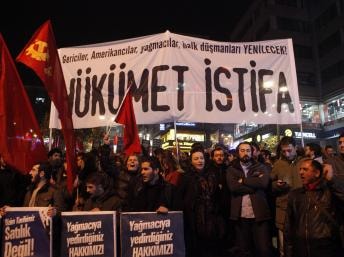Political instability in Türkiye: "Internal attack and external attack"?
(Baonghean) - The Turkish government is currently facing an unprecedented crisis as a series of ministers have been implicated in corruption allegations and have had to resign. This incident has sparked a wave of massive anti-government protests in major cities. In this situation, Turkish Prime Minister Tayyip Erdogan yesterday accused foreign forces and the opposition of being behind the current political instability in the country. Although this accusation has not been clearly verified, analysts have begun to predict a change in the situation in the Middle East, in which Türkiye's position will certainly be affected.
The political earthquake that rocked Türkiye began on December 17 following an unprecedented corruption investigation, which saw the sons of three cabinet ministers arrested and authorities seizing large sums of money from their homes. On December 22, Prime Minister Recep Tayyip Erdogan's government fired 25 senior police officials, including the Istanbul police chief and dozens of other officers - a move seen by the opposition as "retaliation" and to hinder the investigation by the anti-corruption agency. On December 25, Prime Minister Erdogan announced a major cabinet reshuffle, with personnel changes in 10 ministries after the interior, economy and environment ministers resigned over corruption allegations. However, the cabinet change has not satisfied opposition parties, who say it is "too slow and not enough". Dissatisfaction with Prime Minister Erdogan's government was clearly demonstrated through a wave of protests in many major cities of Türkiye, culminating in the "Black Friday" protest with more than 10,000 participants, demanding the resignation of Prime Minister Tayyip Erdogan and his government.
 |
| Protests demanding the government and prime minister resign. |
While struggling to cope with the crisis, Mr. Tayyip Erdogan did not hesitate to accuse it of a “foreign conspiracy”, and the recent corruption investigation was a “smearing move” of the government, with the intervention of external forces and “henchmen” within the country. This accusation is said to be aimed directly at the US and the US Ambassador to Türkiye Francis Ricciardone – who Türkiye believes is conducting an anti-government campaign. The source of the accusation was the statements of the US Ambassador Francis Ricciardone in a meeting with his European Union counterpart in Ankara: “We warned Turkey to end its relations with Iran. They did not listen. Then you will see the collapse of an empire”.
Up to this point, there has been no solid evidence of US involvement in the political upheaval in Türkiye. US State Department spokeswoman Jen Psaki also said that the accusations against the US and Ambassador Francis Ricciardone personally were baseless and “very worrying”. Mr. Ricciardone himself affirmed that the information about the meeting between him and the European Union ambassadors was false, and “no one is allowed to destroy US-Turkey relations”. Despite these moves by US diplomats, analysts still believe that there is actually a significant rift in the relationship between the two countries, stemming from the US's dissatisfaction with many recent actions of Türkiye. Most notably, Turkey ignored the US embargo while still buying oil from Iran and paying in gold through the state-owned Halkbank. In addition, a few months ago, Prime Minister Erdogan's administration also displeased its allies when it announced it would buy a Chinese missile defense system worth more than $3.4 billion, bypassing contractors from the US and the European Union.
The political turmoil in Türkiye is pushing Prime Minister Tayyip Erdogan into the most difficult moment of his career as protests demanding his resignation show no signs of abating. In addition to the task of resolving domestic instability, the bigger challenge for the Turkish government is maintaining its position in the volatile Middle East region. Many analysts believe that the crisis spreading in Turkey could affect the trilateral relationship between Türkiye, Iran and the US, as the US and Western countries are discussing the possibility of easing or even lifting sanctions on Iran after the recent nuclear deal. The US's calculation in the Middle East also depends on Iran's role in resolving the conflict in Syria. Therefore, if it loses the US's favor at this time, combined with domestic instability, it is very likely that Türkiye's economic and political leadership position that it has worked so hard to build will be "put into reverse gear". And that is certainly something that Prime Minister Tayyip Erdogan's government never wanted.
Thuy Ngoc






